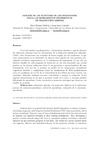Please use this identifier to cite or link to this item:
https://accedacris.ulpgc.es/jspui/handle/10553/54694
| DC Field | Value | Language |
|---|---|---|
| dc.contributor.author | Bolanos-Medina, Alicia | en_US |
| dc.contributor.author | Isern González, José | en_US |
| dc.date.accessioned | 2019-02-18T12:34:07Z | - |
| dc.date.available | 2019-02-18T12:34:07Z | - |
| dc.date.issued | 2012 | en_US |
| dc.identifier.issn | 1130-5509 | en_US |
| dc.identifier.other | Dialnet | - |
| dc.identifier.uri | https://accedacris.ulpgc.es/handle/10553/54694 | - |
| dc.description.abstract | El artículo analiza la predisposición —relativamente duradera— que los alumnos de traducción muestran hacia las herramientas de la traducción asistida por ordenador (TAO). Estas herramientas son evaluadas de forma sesgada por los estudiantes, lo que tiene consecuencias en su utilización. Se observa cómo algunos de estos patrones actitudinales interfieren negativamente en el rendimiento del aprendizaje. Es por ello un objetivo deseable de todo programa de formación en este área desarrollar una actitud positiva en los futuros traductores hacia la incorporación y aprovechamiento de estas herramientas. Con este fin, se presenta un análisis de los componentes actitudinales cognitivos, afectivos y conductuales hacia las herramientas de TAO predominantes entre los estudiantes de la FTI de la Universidad de Las Palmas de Gran Canaria. Los resultados, obtenidos mediante encuesta, contribuirán a mejorar la evaluación de los aspectos determinantes en los que es necesario incidir en el aula y a anticipar posibles dificultades de aprendizaje. Como conclusión se presentan estrategias que favorecen un cambio de actitudes. | en_US |
| dc.description.abstract | Students show an acquired and relatively durable disposition to evaluate computer technology in general, and Computer-Assisted Translation (CAT) tools in particular, and to behave accordingly. However, some of these attitudinal patterns which have been detected in students can negatively interfere in their learning performance. Thus, developing a positive attitude towards using CAT tools in translation students constitutes a desirable objective for any university program in this field. The results of a survey research about the cognitive, affective and behavioural factors of this particular attitude in translation students from the University of Las Palmas de Gran Canaria (Spain) are presented. The aim of this study is to analyse students’ attitudinal components in detail, in order to detect those aspects which need more attention and to anticipate CAT-related learning difficulties. Finally, pathways of promoting a positive attitudinal change are introduced. | en_US |
| dc.language | spa | en_US |
| dc.publisher | 1130-5509 | - |
| dc.relation.ispartof | Sendebar | en_US |
| dc.source | Sendebar: Revista de la Facultad de Traducción e Interpretación [ISSN 1130-5509], n. 23, p. 275-300 | en_US |
| dc.subject | 58 Pedagogía | en_US |
| dc.subject.other | Informática aplicada a la traducción | en_US |
| dc.subject.other | Didáctica de la traducción | en_US |
| dc.subject.other | Proceso de enseñanza-aprendizaje | en_US |
| dc.subject.other | Actitud de aprendizaje | en_US |
| dc.subject.other | Evaluación de la enseñanza aprendizaje | en_US |
| dc.subject.other | Computer-Assisted Translation tools | en_US |
| dc.subject.other | Translation teaching | en_US |
| dc.subject.other | Teaching and learning process, learning attitude, teaching-learning assessment | en_US |
| dc.subject.other | Learning attitude | en_US |
| dc.subject.other | Teaching-learning assessment | en_US |
| dc.title | Análisis de las actitudes de los estudiantes hacia las herramientas informáticas de traducción asistida | en_US |
| dc.title.alternative | An analysis of students’ attitudes towards computer-assisted translation tools | en_US |
| dc.type | info:eu-repo/semantics/Article | en_US |
| dc.type | Article | en_US |
| dc.identifier.scopus | 84890930430 | - |
| dc.identifier.isi | 000216094000012 | |
| dc.identifier.url | http://dialnet.unirioja.es/servlet/articulo?codigo=5309055 | - |
| dc.contributor.authorscopusid | 55974153700 | - |
| dc.contributor.authorscopusid | 55450695000 | - |
| dc.description.lastpage | 300 | en_US |
| dc.identifier.issue | 23 | - |
| dc.description.firstpage | 275 | en_US |
| dc.investigacion | Artes y Humanidades | en_US |
| dc.type2 | Artículo | en_US |
| dc.contributor.daisngid | 5082908 | |
| dc.contributor.daisngid | 2249227 | |
| dc.contributor.authordialnetid | 2586599 | - |
| dc.contributor.authordialnetid | 1017350 | - |
| dc.identifier.dialnet | 5309055ARTREV | - |
| dc.utils.revision | Sí | en_US |
| dc.contributor.wosstandard | WOS:Bolanos-Medina, A | |
| dc.contributor.wosstandard | WOS:Gonzalez, JI | |
| dc.date.coverdate | Diciembre 2012 | |
| dc.identifier.ulpgc | Sí | es |
| dc.description.sellofecyt | Sello FECYT | |
| dc.description.esci | ESCI | |
| dc.description.erihplus | ERIH PLUS | |
| item.grantfulltext | open | - |
| item.fulltext | Con texto completo | - |
| crisitem.author.dept | GIR IDETIC: División de Traducción e Interpretación y Aprendizaje de Lenguas | - |
| crisitem.author.dept | IU para el Desarrollo Tecnológico y la Innovación en Comunicaciones (IDeTIC) | - |
| crisitem.author.dept | Departamento de Filología Moderna, Traducción e Interpretación | - |
| crisitem.author.dept | GIR SIANI: Inteligencia Artificial, Robótica y Oceanografía Computacional | - |
| crisitem.author.dept | IU de Sistemas Inteligentes y Aplicaciones Numéricas en Ingeniería | - |
| crisitem.author.dept | Departamento de Filología Moderna, Traducción e Interpretación | - |
| crisitem.author.orcid | 0000-0001-5956-0166 | - |
| crisitem.author.orcid | 0000-0001-5830-7732 | - |
| crisitem.author.parentorg | IU para el Desarrollo Tecnológico y la Innovación en Comunicaciones (IDeTIC) | - |
| crisitem.author.parentorg | IU de Sistemas Inteligentes y Aplicaciones Numéricas en Ingeniería | - |
| crisitem.author.fullName | Bolaños Medina, Alicia Karina | - |
| crisitem.author.fullName | Isern González, José | - |
| Appears in Collections: | Artículos | |
SCOPUSTM
Citations
6
checked on Jun 8, 2025
WEB OF SCIENCETM
Citations
5
checked on Feb 25, 2024
Page view(s) 5
332
checked on Jan 10, 2026
Download(s)
176
checked on Jan 10, 2026
Google ScholarTM
Check
Share
Export metadata
Items in accedaCRIS are protected by copyright, with all rights reserved, unless otherwise indicated.
